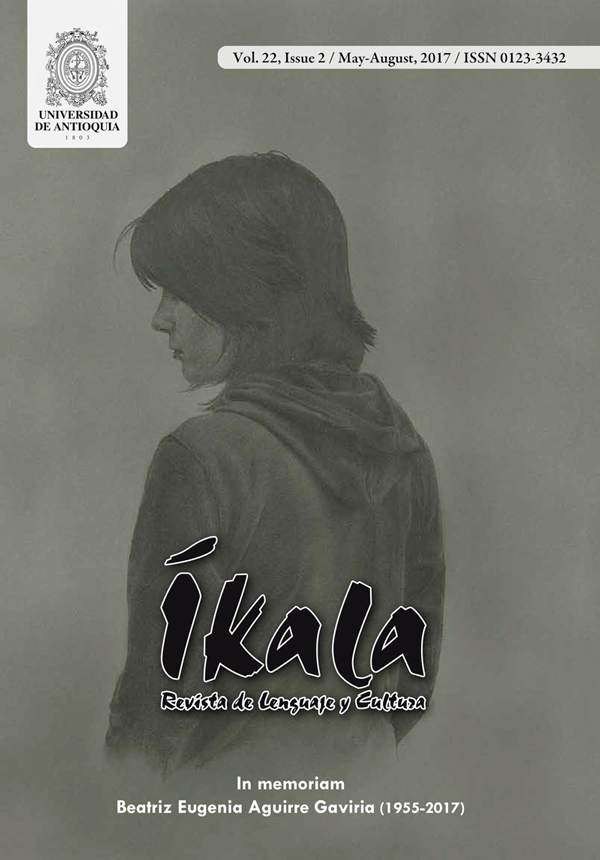Attitudes Associated to Types of Clauses in Texts of History. An Appraisal Theory Approach
DOI:
https://doi.org/10.17533/udea.ikala.v22n02a04Keywords:
systemic functional linguistics, appraisal theory, academic writing, texts of history, transitivity, attitudeAbstract
This research report presents part of the results of a doctoral thesis about academic writing in Spanish within the area of history, following a systemic functional linguistics approach, particularly the transitivity system (Halliday & Matthiessen, 2014), and the Appraisal Theory (Martin & White, 2005), as of attitude assessing meanings. This study aimed to characterize academic language in academic essays at the undergraduate level and in research articles, by identifying their similarities and differences in expressing attitude (dimensions of affection, judgment, and appreciation), as well the relation between clause types in the transitivity system (material, relational, mental, verbal, existential and behavioral processes) present in those meanings. Using UAMCorpusTool software, transitivity was first analyzed in its quantitative and qualitative aspects, and then the types of attitude present in the types of clauses. The results showed that attitude types the most frequent in the area of history are appreciation and judgment, especially in material and relational clauses, while variations in mental and verbal clauses in expressing the types of attitude between corpora would be related to the level of experience in academic writing, genres and subject areas.
Downloads
References
Biber, D. & Finnegan, E. (1989). Styles of stance in English: lexical and grammatical marking of evidentiality and affect. Text, 9(1), 93-124.
Chen, L. (2005). Transitivity in media texts: Negative verbal process sub-functions and narrator bias. IRAL. International Review of Applied Linguistics in Language Teaching, 43(1), 33-51.
Day, Robert A. (2005). Cómo escribir y publicar trabajos científicos (3ª ed. en español). Washington, D. C.: Organización Panamericana de la Salud (OPS).
Eggins, S. & Martin, J. R. (1997). Genres and registers of discourse. In T. A. Van Dijk, (Ed.), Discourse as structure and process. In Discourse studies: a multidisciplinary introduction (Vol. 7, pp. 230-256). London: SAGE Publications.
Eggins, S., Wignell, P. & Martin, J. R. (1993). The discourse of history: distancing the recoverable past. In M. Ghadessy (ed.), Register analysis: theory and practice (pp. 75-109). London: Pinter.
Halliday, M. A. K. (1994). An introduction to functional grammar (2nd ed.). London: Arnold.
Halliday, M. A. K. & Matthiessen, C. M. I. M. (1999). Construing experience through meaning: A language-based approach to cognition. London: Continuum.
Halliday, M. A. K. & Matthiessen, C. M. I. M. (2004). An introduction to functional grammar (3rd ed.). London: Arnold.
Halliday, M. A. K. & Matthiessen, C. M. I. M. (2014). Halliday’s introduction to functional grammar (4th ed.). New York: Routledge.
Hood, S. (2010). Appraising research: Evaluation in academic writing. Houndmills, Basingstoke, Hampshire: Palgrave Macmillan.
Hunston, S. & Thompson, G. (eds.) (2000). Evaluation in text: Authorial stance and the construction of discourse. Oxford: Oxford University Press.
Hyland, K. (1996). Talking to the academy forms of hedging in science research articles. Written Communication, 13(2), 251-281.
Lee, S. H. (2015). Evaluative stances in persuasive essays by undergraduate students: focusing on APPRECIATION resources. Text & Talk, 35(1), 49-76.
Martin, J. R. (1992). English Text. Philadelphia: John Benjamins.
Martin, J. R. & White, P. R. R. (2005). The language of evaluation. Appraisal in English. New York: Palgrave Macmillan.
Matthiessen, C. M. I. M. (1995). Lexico-grammatical cartography: English systems. Tokyo: International Language Sciences.
Moyano, E. I. (2004). La escritura académica: una tarea interdisciplinaria a lo largo de la currícula universitaria. Texturas, 4(4), 109-120.
O’Donnell, M. (2007). UAM CorpusTool (Versión 2.8.10) Software para la anotación de corpus digital.
Oteíza, T. (2013). Recontextualización del pasado nacional reciente en los manuales escolares de Historia. En E.
Moyano (coord.), Aprender ciencias y humanidades: una cuestión de lectura y escritura: aportes para la construcción de un programa de inclusión social a través de la educación lingüística (pp. 367-398). Los Polvorines, Buenos Aires: Universidad Nacional de General Sarmiento.
Oteíza, T. & Pinto, D. (2008). Agency, responsability and silence in the construction of contemporary history in Chile and Spain. Discourse & Society, 19(3), 333-358.
Rodríguez Ávila, Y. C. (2007). El ensayo académico: algunos apuntes para su estudio. Sapiens, 8(1), 147-159.
Thompson, G. & Hunston, S. (2006). Introduction. System and corpus: two traditions with a common ground. In G.
Thompson & S. Hunston (eds.), System and corpus: exploring connections (pp. 1-14). London: Equinox.
Wu, Y. & Dong, H. (2009). Applying SF-based genre approaches to English writing class. International Education Studies, 2(3), 77-81.
Published
How to Cite
Issue
Section
License
Copyright (c) 2017 Íkala

This work is licensed under a Creative Commons Attribution-NonCommercial-ShareAlike 4.0 International License.












